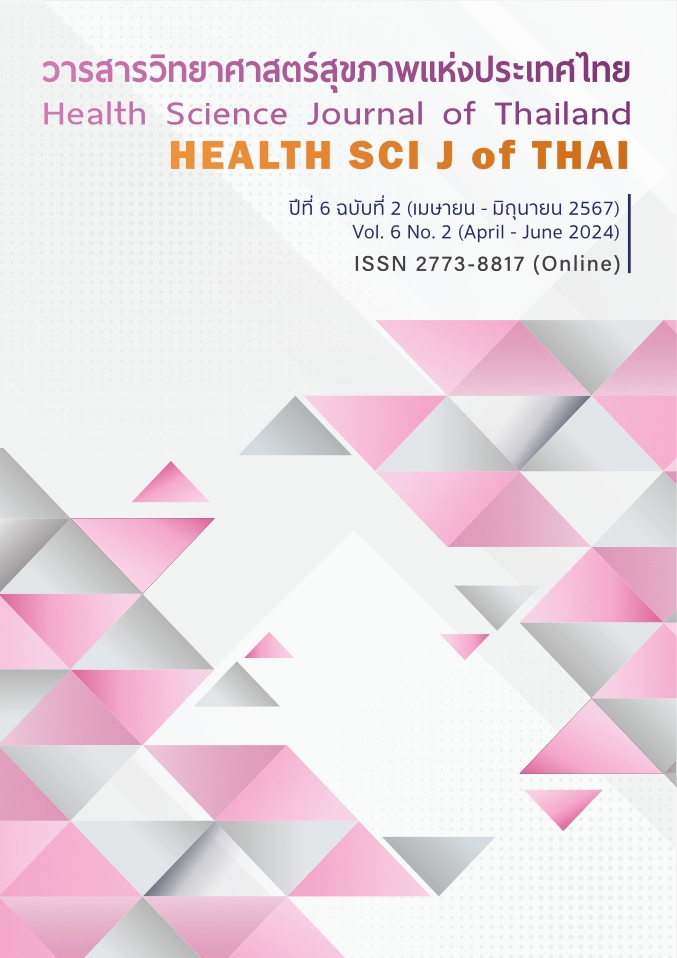Disparities in Access to Fertility Services among Lampang Hospital Personnels
Main Article Content
Abstract
Assisted reproductive services are still difficult to access in many parts of the world. This study aimed to assess the accessibility ratio and differences of Lampang Hospital personnel’s characteristics for accessing fertility services. A cross-sectional study was conducted among 399 fertility-seeking hospital personnel aged 20-50 years old. Data was collected using an electronic questionnaire. Chi-square and Fisher’s exact tests were used to compare the differences between groups. The results showed that 21.3% of the participants had access to fertility care. Healthcare personnel, civil servants, level of education, and monthly income had a difference in accessing fertility services and assisted reproductive technologies. These findings suggest that career, job position, education, and income can have a significant impact on the accessibility of fertility services and assisted reproductive technologies.
Article Details

This work is licensed under a Creative Commons Attribution-NonCommercial-NoDerivatives 4.0 International License.
References
Blakemore JK, Maxwell SM, Hodes-Wertz B, Goldman KN. Access to infertility care in a low-resource setting: bridging the gap through resident and fellow education in a New York City public hospital. J Assist Reprod Genet. 2020; 37: 1545-52.
World Health Organization. Infertility 2020. [Internet]. 2023 [Cited in 15 July, 2023]. Available from: https://www.who.int/news-room/fact-sheets/detail/infertility.
Deejapo J, Theerakulcha J, Phumosakul S. The Relationships between Personal Factors, Stress, the Wife’s Role, Marital Relationship, and Quality of Life among Infertile Women. Journal of Phrapokklao Nursing College. 2017;28(2):67-79. (In Thai)
American Society for Reproductive Medicine. Disparities in access to effective treatment for infertility in the United States: an Ethics Committee opinion. Fertil Steril. 2015; 104(5): 1104-10.
Traiwattanawong N, Karcharnubarn R. Factors related to infertility treatment. Journal of Social Sciences Srinakharinwirot University. 2019; 22(1): 59-73. (In Thai)
Chambers GM, Sullivan EA, Ishihara O, Chapman MG, Adamson GD. The economic impact of assisted reproductive technology: a review of selected developed countries. Fertil Steril. 2009;91(6):2281-94.
Chaiwat P, Thammawitpricha P. Attitude and condition of modern family with childfree by choice. Sripatum Review of Humanities and Social Sciences. 2018;17(2):49-59. (In Thai)
Group ECW, Group ECW, Baird D, Barri P, Bhattacharya S, Devroey P, et al. Economic aspects of infertility care: a challenge for researchers and clinicians. Hum Reprod. 2015;30(10):2243-8.
Perritt J, Eugene N. Inequity and injustice: recognizing infertility as a reproductive justice issue. F S Rep. 2021;3(2 Suppl):2-4.
Adashi EY, Dean LA. Access to and use of infertility services in the United States: framing the challenges. Fertil Steril. 2016;105(5):1113-18.
Afferri A, Allen H, Booth A, Dierickx S, Pacey A, Balen J. Barriers and facilitators for the inclusion of fertility care in reproductive health policies in Africa: a qualitative evidence synthesis. Hum Reprod Update. 2022; 28(2):190-9.
Morshed-Behbahani B, Lamyian M, Joulaei H, Rashidi BH, Montazeri A. Infertility policy analysis: a comparative study of selected lower middle-middle-and high-income countries. Global Health. 2020;16:1-9.
Department of Health Service Support. Medical facility for medical assisted reproductive technology. [Internet]. 2023 [Cited in 14 July, 2023]. Available from: https://mrd.hss.moph.go.th/mrd1_hss/?p=2231.
Shah PK, Gher JM. Human rights approaches to reducing infertility. Int J Gynaecol Obstet. 2023; 162(1): 368-374.
Perez CM. An Integrative Review of Fertility Knowledge and Fertility-Awareness Practices Among Women Trying to Conceive. Nurs Womens Health. 2021;25(3):198-206.


